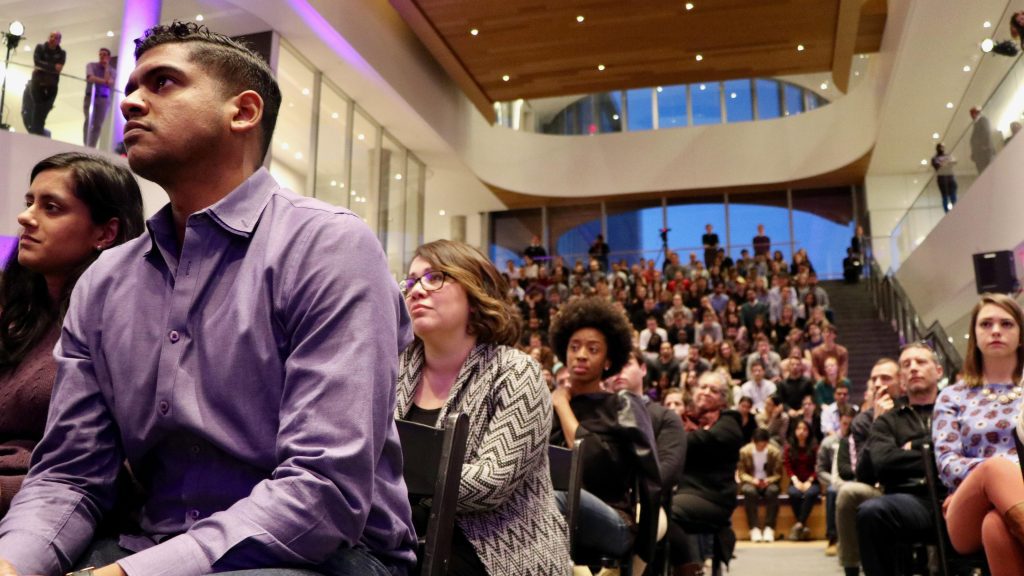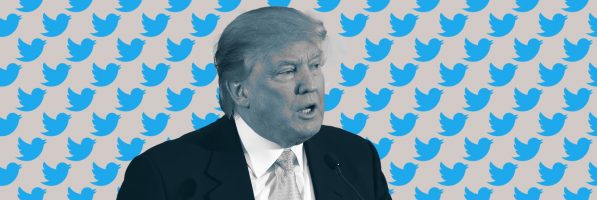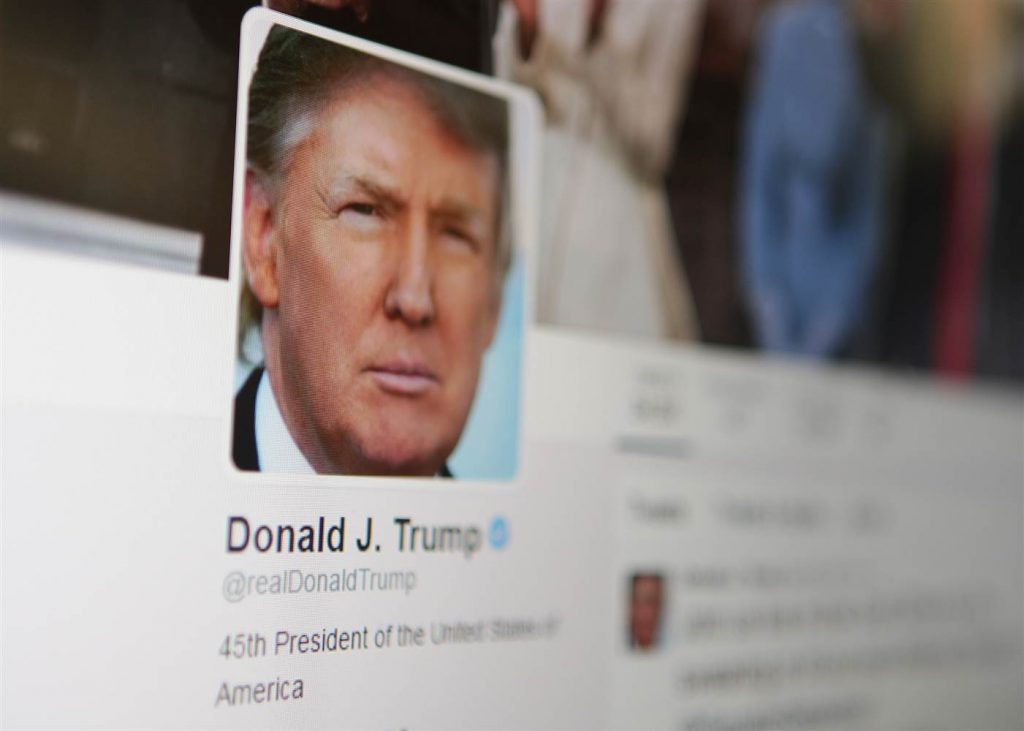Joe Biden Talks Industrialization, Income Inequality at Northwestern Kellogg

On March 9th, an eager audience gathered at Northwestern University’s Kellogg School of Management to hear what wisdom Joe Biden might have to impart from his distinguished political career to the world of business.
Speaking the day after observations of International Women’s Day around the world, the former vice president opened his talk with with a message about inclusion. He cautioned the crowd that “in order for a country to succeed… it has to husband all its assets. It cannot leave half its initiative, half its brain power, half of its courage, half of its capability, half of its strive behind.”
Although it was only a preface, the call for gender equality set the tone for the rest of the speech. The overarching theme, in Biden’s words, was inequity. And he didn’t just discuss the wage gap; he focused on what he called “geographic inequity,” or the rising inequality between various American cities and towns.
For much of his time at the podium, Biden decried the recent fate of industrial America, and of the middle class. He gave a bleak description of once-thriving Midwest towns and cities: “It’s called depression,” he said. “Empty factories, empty storefronts, empty homes, empty wallets. And the underpinnings of this geographic inequity are no mystery. It’s been in the making for years. States, and state laws, have undercut organized labor and the right to bargain, stunting the movement. The labor movement has been hollowed out and good, middle class jobs have been lost.”
Biden went on to discuss the disparity between cities on the coasts and those in the Midwest, saying that “a poor child in San Francisco has twice the chance of making a top income than one born in Detroit or Wilmington or Saginaw.”
He concluded that this is due to the fact that “they come from less segregated communities. There’s less income inequity, allowing them to see success around them. Their school systems are better funded. Social networks are stronger. More people are taking part in their communities.”
The talk was framed by current political issues, and the general solution that Biden gave spoke directly to the audience, comprised of MBA students and faculty. The major takeaway of the speech was that business leaders—those who will go on to shape the economy and, to some extent, policy—have a social responsibility.
He emphasized the importance of work, not just for economic stability, but as a source of identity. Biden recounted his father telling him, “Joey, you gotta remember a job’s about a lot more than a paycheck. It’s about your dignity, it’s about your respect, it’s about your place in your community. I mean this literally, not figuratively.”
As an example, he brought up causal links between unemployment and other social ills. For instance, he added that “every one percent increase in unemployment raises opiod deaths in a community by four percent.”
For Biden, the social obligation to push for fair wages and workers’ rights is not just about raising morale. Rather, it is central to the spirit of capitalism. The role that the business community must play in this scenario, according to Biden, is to push back against policies that limit workers’ rights.

Students at Northwestern Kellogg during the Biden speaking event. Photo via Evan Garcia / Chicago Tonight
Making sure that workers earn wages that match their productivity is a necessary part of a healthy economy. And, by extension, a healthy economy produces and furthers a healthy society.
Biden identified a few common business practices that he described as both anti-labor and anti-competition. He posed a rhetorical question to the audience: “The capitalist system, I thought—and I’m a capitalist—is all about being able to compete and bargain. So how do you justify non-poaching agreements to prevent one franchise from hiring away workers from another franchise?”
He added, “How do you justify taking hourly wage-earners, not managers at all, and re-classifying them, denying them in 1.2 billion dollars in wages, to go to shareholders. Where’s that bargaining deal? Where’s that capitalist competition?”
While Biden’s expertise and experience do not lie in business, he did highlight the importance of responsible business practices in a stable and equitable society. And perhaps, ultimately, that is the most valuable insight that he can provide to MBA students—a unique vision about business that tries to examine its role in the rest of the social world, along with profit and productivity.
This article has been edited and republished with permissions from our sister site, Clear Admit.
Boston News: Northeastern Explores Trump Tweets, MIT Offers FinTech Advice and More

Let’s explore some of the most interesting stories that have emerged from Boston metro business schools this week.
Can A Trump Tweet Dramatically Sway A Company’s Value? – Northeastern’s D’Amore-McKim Blog
Will Clark, DMSB ’17, along with Northeastern University D’Amore-McKim School of Business finance professors David Myers and Jeffery Born, sought to understand the impact that President Trump’s tweets—which often directly address publicly traded companies like Ford, Toyota, Walmart, GM, and Boeing—had on their stock market value.
“Past presidents communicated through the media. This was the first time that a president was communicating directly with the public—with investors—about companies. We really weren’t sure what to expect from the data,” says Clark, who is now a credit analyst with Morgan Stanley.
The trio’s research found that Trump’s tweets, in fact, did have some impact on companies, often increasing trade volume within the first few hours and days after he references them on the social media platform. The research was revealed in the academic journal Algorithmic Finance.
“The team found that Trump’s tweets dramatically increased trading volume for the companies’ stocks in the first few days following a tweet. They also found that positive (or negative) tweets about companies increased (or decreased) the firms’ stock prices by a modest amount—just 1 percent. But the changes were only temporary: Within a few days, the firms’ trading volumes and stock prices returned to pre-tweet levels.”
The lasting effect, however, was found to be longing. The trio notes that the most active traders, which they refer to as “noise traders,” were very reactive to Trump’s words, with trading tapering off after only a few days.

“They’re regular people and under-informed investors who want to get in and out and make a buck without thinking too long and hard about it,” Born notes about the financial impact of Trump tweets.
You can read more about the financial research on the Trump tweets from D’Amore-McKim here.
3 Lessons To Keep In Mind When Starting A FinTech Venture – MIT Sloan Newsroom
MIT Sloan School of Management MBA alum Sophia Lin, ’12, and her partner Andrew Kelley of the FinTech startup Keel, which connects “rookie investors with more seasoned ones,” shares some hard-won lessons in an op-ed for the Sloan blog. First of all: beware of hidden costs specific to FinTech. “
“Starting costs are higher than other industries because of data, infrastructure, and security requirements,” Lin said. “Data is expensive, which stops a lot of early stage startups from entering this field. But you need data to build your product.”
Read all of Lin’s words of wisdom here.
More CEOs Have Begun To Take Social Responsibility Seriously – HBR
CEOs from Facebook’s Mark Zuckerberg to Blackrock’s Larry Fink have begun to take very public stands to address the long-term impacts their products have had and continue to have on communities and the environment.
“We are witnessing a big, transitional moment—akin to the transition from analog to digital, or the realization that globalization is a really big deal. Companies are beginning to realize that paying attention to the longer term, to the perceptions of their company, and to the social consequences of their products is good business.”
Harvard Business School John and Natty McArthur University Professor Rebecca M. Henderson also explains that there are distinct differences between the size of a company, which often contrasts with the social goals of the company. The larger the company, the more long-term the outlook, she explains. Unlike small companies, larger firms worry about quarter-to-quarter results less.
“Big firms can also internalize certain externalities. An externality is a cost from a transaction that doesn’t fall on the buyer or the seller. If I pollute the air to make a product I sell to you, the cost of that pollution is spread out across society, and isn’t incorporated in the price I charge you for the product. Externalities pose problems for markets, since neither buyer nor seller have any incentive to deal with the costs. But sometimes, for really large firms, things work differently.”
The unfortunate causality, she notes, is that we are often reliant on the largest companies to take the initiative for causes that may be considered part of the global good. If some companies among the Fortune 500 elect to, say, go carbon neutral within the next decade, that can have a profound impact on other competing companies. And if those initiatives are not as profitable, there is an even greater risk of other companies being reluctant to attempt similar efforts.
Read more about the growing CSR trend among CEOs here.
Point Loma University Writes Letter to POTUS About Immigration

In early February, Point Loma Nazarene University President Bob Brower wrote an open letter to President Trump and Vice President Pence. In the letter, President Brower, alongside Jon R. Wallace, President of Azusa Pacific University and Jim J. Adams, President of Life Pacific College, spoke about the recent immigration policies. They asked President Trump to “consider the pain that these restrictions cause for many innocent people.”
